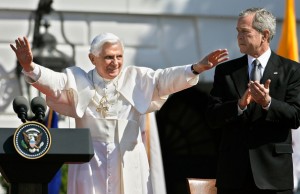

| Visitors Now: | |
| Total Visits: | |
| Total Stories: |

| Story Views | |
| Now: | |
| Last Hour: | |
| Last 24 Hours: | |
| Total: | |
The End of a “Catholic Moment”?
 Ross Douthat mourns (prematurely, I fear) ‘the end of a Catholic moment’:
Ross Douthat mourns (prematurely, I fear) ‘the end of a Catholic moment’:
The mid-2000s were the last time the Catholic vision of the good society — more egalitarian than American conservatism and more moralistic than American liberalism — enjoyed real influence in U.S. politics. At the time of John Paul’s death, the Republican Party’s agenda was still stamped by George W. Bush’s “compassionate conservatism,” which offered a right-of-center approach to Catholic ideas about social justice.
Hmmm.
I have no particular objection to “faith-based initiatives” and the like (in fact, under the right circumstances they can be thoroughly good things), nor, for that matter, with the notion that the embrace of (ultimately disastrous) “compassionate conservatism” was what it took to win the 2000 election, but let’s be clear that Catholic ideas of “social justice” are part of a corporatist ideology that (as some of Benedict XVI’s pronouncements remind us) is very difficult indeed to square with traditional American notions of individualism and the free market. To his credit, I don’t think that’s what George W. Bush was trying to do.
Mr. Douthat continues:
Whereas eight years ago, a Catholic view of economics and culture represented a center that both parties hoped to claim, today’s Republicans are more likely to channel Ayn Rand than Thomas Aquinas, and a strident social liberalism holds the whip hand in the Democratic Party.
It’s interesting to read of a “Catholic view of economics and culture” (in the sense that Douthat defines those terms) as representing “a center” either now, or then. I have my doubts.
As for Rand or Aquinas, I would have distinct reservations about channeling either, although—if really forced to choose— I would prefer the former to the latter (I suspect that I would have even more reservations about old Aquinas, if I could ever bring myself to devote any time at all to his endless—and dreary— theological and philosophical musings, but life’s too short, and there’s only the one).
More importantly, I suspect that the broader point that Douthat is making about the GOP will turn out to be wrong. As he notes later on, “a synthesis of social conservatism and more egalitarian-minded economic policies could have a great deal of mass appeal”. That’s true, I reckon (so long as the social conservatism is more—so to speak—Edmund Burke than Todd Akin), and that is why the Republicans will end up, I have long thought (and Tea Party notwithstanding, still do), as an Americanized version of Europe’s Christian Democrats, with all the baggage that that will entail.
De Tocqueville would weep.
2013-02-17 13:30:10
Source: http://secularright.org/SR/wordpress/the-end-of-a-catholic-moment/
Source:


